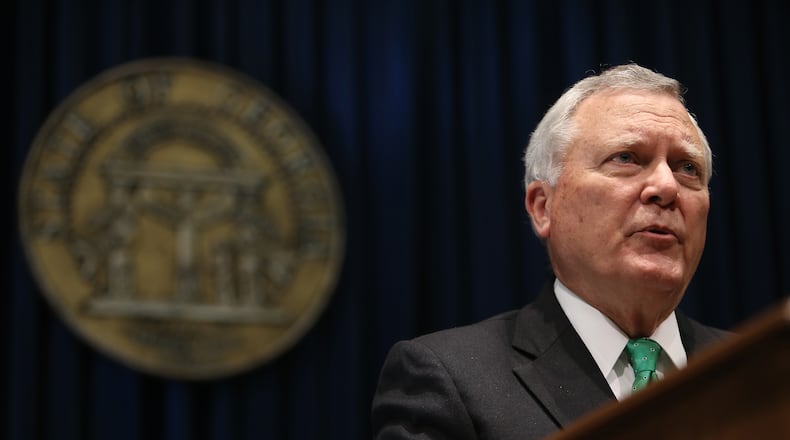Gov. Nathan Deal faces another dicey political question as he debates whether to sign legislation that would allow college students to carry guns onto campuses after GOP lawmakers defied his personal request for changes to the measure.
The two-term Republican has already vetoed the controversial “religious liberty” legislation long sought by religious conservatives, and rejecting a second measure with broad support among the GOP base in an election year could further jeopardize his standing in his party.
But Deal has been lukewarm on the “campus carry” measure, and lawmakers ignored his attempt to push for changes that would exempt child-care centers and make other exceptions to the gun rights expansion. The governor has until Tuesday to make up his mind, and he indicated he'll wait until next week to make his decision.
"I'm listening to both sides of the argument, and I've pretty well heard most of them already," Deal said. "You have very interested people who have very passionate opinions on both sides of the issue. And it makes it one of those tough choices that a governor has to make. But it's one of those things that a governor is supposed to do - make the hard choices and not necessarily play the political game - and do what's in the best interest of as many Georgians as possible. There's no easy option."
Here’s a closer look at the debate:
What does the legislation do?
House Bill 859 would allow anyone 21 or older with a weapons license to carry a concealed gun anywhere on a public college or university campus, except for inside four places: dormitories, fraternities and sorority houses, and at athletic events. Everywhere else, including campus child care centers, music concert venues and classrooms, would be open under the bill.
Hasn’t this come up before?
Yes, several different times. It was left on the cutting-room floor in 2014 as lawmakers passed broader legislation – dubbed by critics the "guns everywhere" bill - that allowed residents to carry their firearms into some bars, churches and government buildings.
What do supporters say?
The legislation was long sought by conservatives and Second Amendment activists who depict it as a crucial safety measure for students, faculty and administrators to protect themselves. They point to recent high-profile crimes on college campuses as an example for why the expansion is needed.
What about the critics?
Gun control advocates have joined with some students, parents and faculty members to warn that expanding gun rights on campuses would increase the likelihood of violent shootings, and raise doubts about whether some students have the emotional maturity to carry weapons. But the most influential critic has been the powerful University System of Georgia, which has – until now – halted efforts from lawmakers, with the help of opponents in the Senate, to pass the legislation.
So what happened this year?
Leaders of both legislative chambers rallied behind the legislation, despite the misgivings of higher education administrators and campus presidents. Senate critics abandoned their concerns as well, letting the measure reach a final vote. It was smoothed along by election-year politics, as Republicans facing tough primary challenges looked to trumpet base-pleasing legislation.
Where does Gov. Deal stand?
That's a tricky one. Deal publicly opposed the "campus carry" provision in the midst of his own re-election campaign in 2014, but this year he's struck a more … unpredictable … chord.
In an interview in February, Deal said fears that campus carry would lead to a "Wild West scenario" were overblown. But days later, he said he hoped lawmakers could find room to compromise after Hank Huckaby, the head of Georgia's higher education system, and several high-profile university leaders raised questions.
Shortly after the measure passed, Deal called on lawmakers to make substantive changes to the measure. He sent hand-written notes to House Speaker David Ralston and Lt. Gov. Casey Cagle urging them to back legislation that would exempt on-campus child care facilities, faculty or administrative office space and disciplinary meetings and other hearings from the gun rights expansion. Both declined to press for changes.
In an interview in April, Deal said he is torn over what to do.
“Admittedly, it’s another tough decision. Would I have preferred they not put that on my plate (without the changes)? Yes, I would have preferred that,” he said. “But they did. And I have to come, once again, to doing what I think is in the best interest of all the citizens of the state.”
What type of lobbying has there been?
Deal's office has been flooded with hundreds of emails and calls from both sides of the debate. Everytown for Gun Safety spent at least $25,000 on ads opposing the legislation and The Red & Black – UGA's student newspaper – ran a rare front-page editorial urging him to veto the bill. The National Rifle Association and GeorgiaCarry.org have both ratcheted up the pressure on Deal as well, as have Republican allies who have reminded him of his past support for gun legislation.
So what are his options?
There aren't any easy political solutions. A veto would enrage some rank-and-file Republicans already ticked off at Deal for nixing the "religious liberty" measure. Signing the legislation after lawmakers so publicly rejected his pleas for changes not only would alienate the higher education apparatus, but it would also send a message to legislators that they could openly flout his demands.
Are those his only choices?
Nope, and this is where it could get interesting. Deal could do nothing with the bill and let it automatically become law after 40 days, but that's considered very unlikely. He hasn't yet used that option since he took office in 2011. Another alternative could have him veto the legislation but then draft an executive order that gives campus presidents or the university system more leeway to allow limited firearms on campuses, though it's uncertain exactly how that would work.
About the Author
The Latest
Featured




